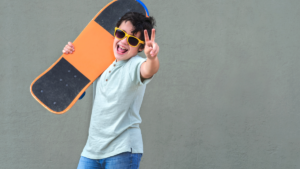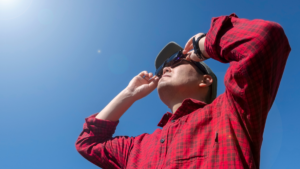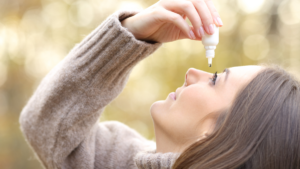We all know it is important to keep children’s eyes safe when playing sports and doing physical activity, but what about adults and seniors? Well, it is just as important! Adults and seniors need the same eye protection that is provided to children. In fact, eye trauma can result in pain, vision loss or disease. That’s why it is important that active senior citizens utilize proper eyewear and protection when playing sports. It allows you to keep enjoying your athletics while maintaining proper eye health. Here are some tips to keep you playing (and seeing) in a healthy way.
Proper Eye Protection
Whether you wear corrective lenses or not, it is important to protect your eyes from a multitude of factors. For example, playing a ball-focused sport, like tennis or pickleball, you want to make sure that your eyes are protected from the high speed nature of the sport. Being hit in the eye with a ball flying at a high speed can cause damage or even lead to serious eye diseases, such as retinal detachment, resulting in vision loss¹. Optometrists in Colorado suggest that you wear protective eyewear such as racquet sports glasses when playing your sport of choice. The safety glasses you wear should be made of polycarbonate with UV filters. Safety glasses can be made with your prescription and worn in place of your day-to-day glasses. Even if you wear contact lenses, wearing non-prescription safety glasses in conjunction with them is highly suggested because they will help to protect you from potential eye trauma.
If you do experience eye trauma, be sure to contact your optometrist right away as they can help you quickly and efficiently without a visit to the ER!
UV Protection
Protecting your eyes from harmful UV rays is always important (especially here in Colorado)! Wearing sunglasses during the summer, and all year, can help protect you from damaging light from the sun and even indoor sources.
To provide adequate protection for your eyes, sunglasses should²:
- Block out 99 to 100% of both UV-A and UV-B radiation.
- Screen out 75 to 90% of visible light.
- Have lenses that are perfectly matched in color and free of distortion and imperfection.
- Have lenses that are gray or brown depending on your preference.
For sports participation, sunglass lenses should be made from polycarbonate or Trivex® material, just like the safety glasses/goggles mentioned before. These lenses are very durable and resist impact. Wearing wraparound frames should be considered as they offer even more protection for your eyes.
There are even certain contact lens brands that offer UV protection and are a great option for everyday use. Be sure to check with your optometrist during your annual comprehensive exam to see which option is the best fit for you and your sun protection needs.
Vision Exam
To keep you at peak athleticism, be sure to schedule your annual comprehensive eye exam. Not only will your optometrist check your vision and offer you corrective lenses if necessary, but they will also screen for over 270 different diseases! Being confident in your vision and overall eye health will surely up your game, whether it is pickleball, tennis or everyday life. If you are in need of an optometrist near you, click here to find one!
References:
- https://icrcat.com/en/eye-health/athletes/#:~:text=How%20should%20athletes%20protect%20their%20vision%3F,-Protection%20against%20sunlight&text=The%20use%20of%20protective%20sunglasses,the%20retina%20or%20the%20macula.
- https://www.aoa.org/healthy-eyes/caring-for-your-eyes/uv-protection?sso=y

Kick Start Your New Year’s Resolution with Your Eye Health!
Now is a great time to get a head start on your New Year’s resolution! What better way to care for your health than starting

Vision Awareness Patch Program
Girl Scout leaders have you heard? There is now an eye health patch that your Girl Scout troop can earn! The Colorado Optometric Association and

Eye Health and Sport Safety
Summer is nearly here, and kids are excited to go out and play! But with this we need to ensure that their eyes and vision

Are Your Eyes Ready for the Upcoming Total Solar Eclipse?
A total solar eclipse¹ will cross the United States on April 4, 2024, passing over Texas, and traveling through Oklahoma, Arkansas, Missouri, Illinois, Kentucky, Indiana, Ohio,

The Time Has Come to Use Your Health Benefits!
Have you made good use of your health benefits this year? If not, consider using your Health Savings Accounts (HSA) or Flexible Spending Accounts (FSA)

Winter is Coming – So Are Dry Eyes
Brace yourselves, winter is coming and so are dry eyes! Winter weather conditions are one of the leading causes for dry eye symptoms. This is